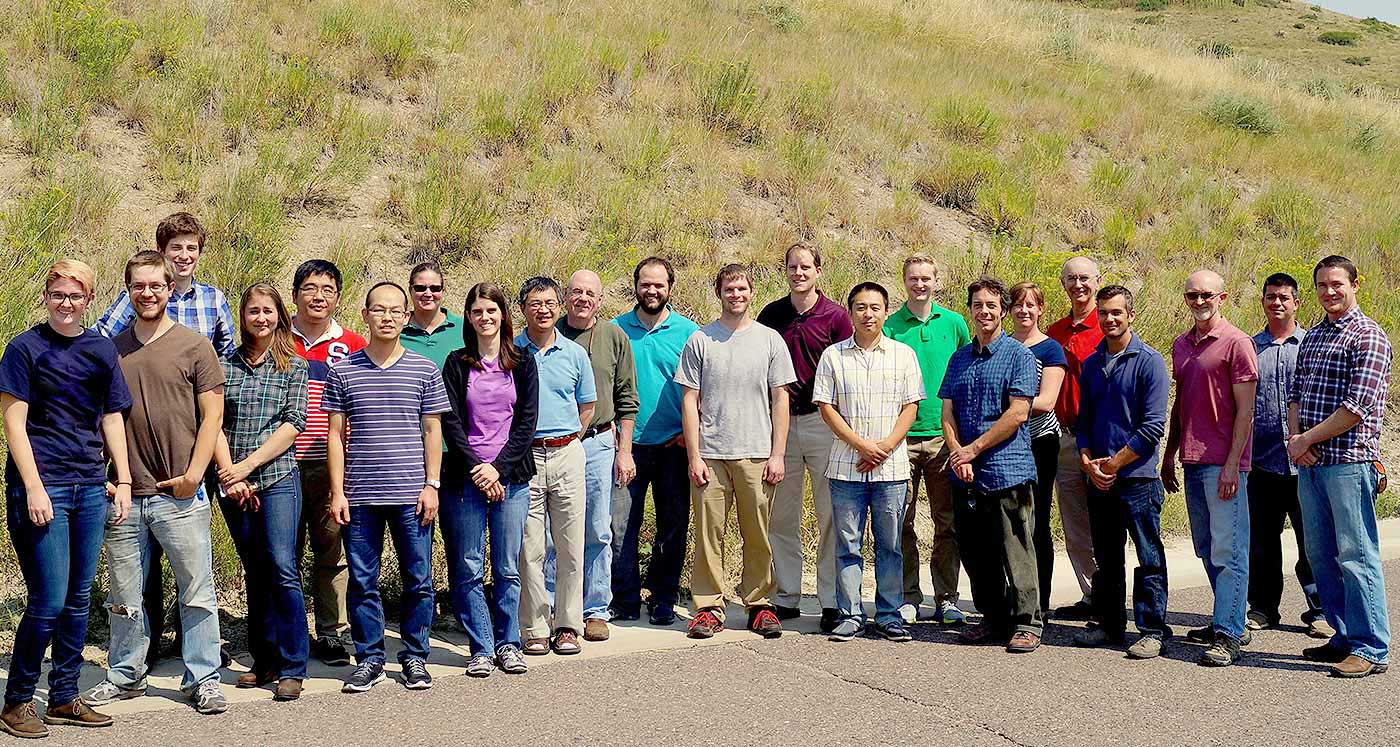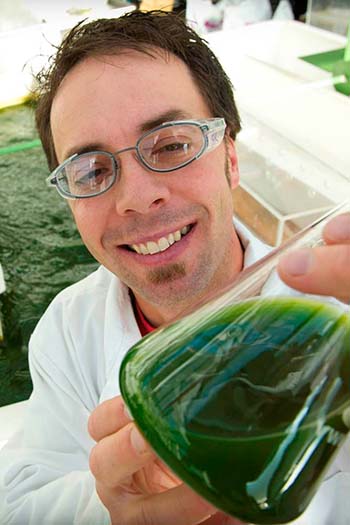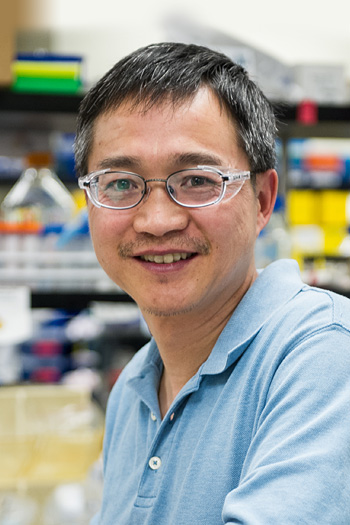Algal Biofuels
NREL is developing technologies and helping prepare a new generation workforce to enable the commercialization of algal biofuels.
We are focused on understanding the current cost for algal biofuels production and using that information to identify and develop cost reduction strategies. Our work is distributed across the entire value chain from production strain identification to biofuel and bioproducts upgrading.
Learn about our algal biofuels techno-economic analysis capabilities.
Featured Publications
Combined algal processing: A novel integrated biorefinery process to produce algal biofuels and bioproducts, Algal Research (2016)
Process Design and Economics for the Production of Algal Biomass: Algal Biomass Production in Open Pond Systems and Processing Through Dewatering for Downstream Conversion, NREL Technical Report (2016)
Phosphoketolase pathway contributes to carbon metabolism in cyanobacteria, Nature Plants (2015)
Acid-catalyzed algal biomass pretreatment for integrated lipid and carbohydrate-based biofuels production, Green Chemistry (2015)
Ethylene-forming enzyme and bioethylene production, Biotechnology for Biofuels (2014)
View all NREL algal biofuels publications.
Capabilities
Preserving Algal Biofuels Strains
With the increasing importance algae will play in the future of biofuels and food agriculture, long-term preservation of the genetic diversity and original state of the organism is critical. Algae strains can drift genetically over time as they adapt to the reduced light and growth conditions in a laboratory setting, particularly when strains are maintained under constant conditions such as a culture collection for years on end. By carefully freezing these cultures in liquid nitrogen, we can indefinitely maintain the genetic state of the sample for future research in biofuels production and other useful traits.
Contact: Eric Knoshaug
Producing Transportation Fuels via Photosynthetically Derived Ethylene
We are engineering the cyanobacterium Synechocystis sp. to produce ethylene and other products during phototrophic growth. NREL bioethylene research received a 2015 R&D 100 Award, and on top of that, a R&D magazine Editor's Choice Award in the Materials/Mechanicals category.
Contact: Jianping Yu
Identifying Promising Strains
NREL is collaborating with Los Alamos National Laboratory (LANL) and Pacific Northwest National Laboratory to identify a small number of potential algal production strains manifesting properties necessary for deployment, including temperature optima for summer and winter crops, growth on either salt water or fresh water, and genetic tractability.
For more information, see LANL's Greenhouse website.
Contact: Michael Guarnieri
Engineering Biofuels Strains
We are evaluating the potential for small RNA-based engineering in algae and other lipogenic microorganisms by conducting whole cell small RNA surveys to identify the regulating RNAs that affect the genes and pathways for biofuels production. Once identified, these small RNA species will be used to engineer organisms for increased biofuels production and other useful traits.
Contact: Eric Knoshaug
Establishing Testbeds
As a member of the Algae Testbed Public-Private Partnership led by Arizona State University, we are focusing on establishing a sustainable network of regional testbeds to gather and share information within the algal research and development community, facilitate innovation, and accelerate growth of the algal biofuels and bioproducts industry. Our goals are to increase stakeholder access to high-quality, outdoor cultivation and laboratory facilities; support DOE's techno-economic, sustainability, and resource modeling activities; close critical knowledge gaps; and inform analyses of the state of technology for producing algal biofuels and bioproducts.
Contact: Philip Pienkos
Researching Systems Biology
We are working on a multi-institutional team, led by Johns Hopkins University, to construct symbiotic relationships between microbial phototrophs (cyanobacteria or algae) and heterotrophs (bacteria or yeast), enabling development of a coupled system for light-driven CO2 fixation and high-efficiency synthesis of oils suitable for use as biofuels.
Contact: Michael Guarnieri
Enhancing Harvest and Thermocatalytic Processing
We are testing the potential of benthic algae cultivation to facilitate harvest and downstream conversion processes, reduce energy and water consumption, and yield higher-concentration biomass at harvest.
Algal Biomass Conversion
NREL is developing novel process options to reduce the cost of algal biofuel production through more complete utilization of algal biomass. We have developed a low-cost, low-energy method to deconstruct algal biomass to allow for recovery and upgrading of lipids, carbohydrates, and proteins to biofuels and bioproducts.
Contact: Philip Pienkos
Coproduct Development from Algal Biomass Components
We are performing detailed compositional analysis to identify a portfolio of high value co-products and ultimately quantifying the value of the biomass for different conversion or upgrading pathways. We intend to establish a new standard for algal biomass valorization based on total potential revenue per ton. In analogy with the notion of replacing the whole barrel of crude oil with renewable alternatives, we investigate options for the production of bio-derived chemicals that have the potential to replace petrochemical products, i.e., are of high value and command a market large enough to impact costs of biofuel production.
Contact: Lieve Laurens
Technical Standards for the Algae Industry
Our group works toward the coordinated development of standard analytical procedures for algal biomass characterization. To do this we are leading research on the development and validation of novel methodology to define and describe the major components of algal biomass. Standard biochemical compositional analysis methods can be freely downloaded online. The foundation of microalgal component analysis is carried forward by the Algae Biomass Organization through the distribution of the Industrial Algae Measurements document, now in version 7.0. More information can be found on the Algae Biomass Organization's website, where the IAM document can be downloaded.
Contact: Lieve Laurens
Algae-Derived Green Crude Valorization Supporting Advancements in Algal Biomass Yield
NREL is a member of the Algae Technology Education Consortium, a multi-institutional project led by the Algae Foundation that is working with universities, algal biofuel companies, and community and vocational tech colleges to develop a algal-based curriculum to train tomorrow's workforce.
Contact: Lieve Laurens
Training the Next Generation Workforce
NREL is a member of the Algae Technology Education Consortium, a multi-institutional project led by the Algae Foundation that is working with universities, algal biofuel companies, and community and vocational tech colleges to develop an algal-based curriculum to train tomorrow's workforce.
Contact: Cindy Gerk
Performing Techno-Economic Analysis
We are providing techno-economic modeling and analysis to support the algae-related biomass program research and development activities. This includes the creation of process and economic models (with peer-reviewed documentation) for cultivation, processing, and conversion of algal biomass to fuels and coproducts, relating key process parameters with overall process economics.
Contact: Ryan Davis
Research Team

Principal Investigators







Earl Christensen
Gina Chupka
Lisa Fouts
Eric Vadelius
Nick Sweeney
Lukas Dahlin
Collaborators
Algae Biomass Organization
Algae Foundation
Algae Testbed Public-Private Partnership
Arizona Center for Algae Technology and Innovation
ASU LightWorks
California Polytechnic State University
Cellana
Colorado School of Mines
Commercial Algae Management, Inc.
Florida Algae LLC
Georgia Tech
Johns Hopkins University
Los Alamos National Laboratory
Pacific Northwest National Laboratory
Sandia National Laboratories
Sapphire Energy
UTEX – The Culture Collection of Algae, University of Texas at Austin
Valicor Renewables
This program is funded in part by the U.S. Department of Energy's Bioenergy Technologies Office.
Share
